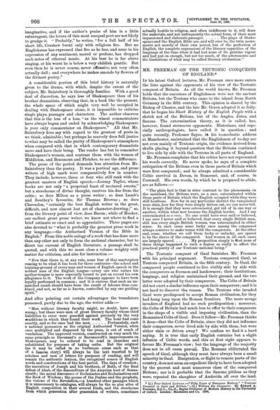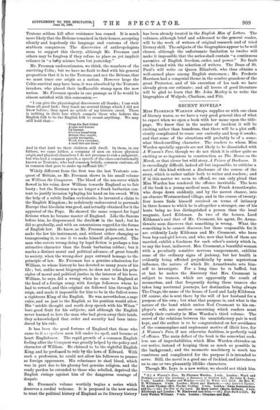MR. FREEMAN ON THE TEUTONIC CONQUESTS OF ENGLAND.*
IN his latest Oxford lectures, Mr. Freeman once more enters the lists against the opponents of his view of the Teutonic conquest of Britain. As all the world knows, Mr. Freeman
holds that the ancestors of Englishmen were not the ancient Britons, but the Teutons who came to the island from North Germany in the fifth century. This opinion is shared by the
Bishop of Chester, and the late Mr. Green adopted it so fully, that he began his Short History of the English People with a
sketch not of the Britons, but of the Angles, Jutes, and Saxons. The extermination theory, as it is called, has, however, found strenuous opponents. Historians, and espe- cially anthropologists, have called it in question ; and
quite recently, Professor Sayce, in his iconoclastic address at Manchester, maintained that the Englishmen of to-day are not even mainly of Teutonic origin, the evidence derived from skulls placing it beyond question that the Britons continued to live side by side with the Teutons in all parts of England.
Mr. Freeman complains that his critics have not represented his words correctly. He never spoke, he says, of a complete extirpation of the Britons even in those parts of Britain which were first conquered ; and he always admitted a considerable Celtic survival in Devon, in Somerset, and, of course, in Cornwall. His own words, by which he is prepared to abide, are as follows :—
" The plain fact is that in utter contrast to the phenomena on the mainland, the Britons were, as a race, exterminated within those parts of Britain which the English occupied while they were still heathens. How far in any particular district the vanquished were slain, how far they were simply driven out, we can never tell. It is enough that they were exterminated, got rid of in one way or another, within what now became the English border. And I say exterminated as a race. No one could have ever said or believed, I am sure I never said or believed, that every single British man, still less every single British woman, was exterminated in either sense. In such cases some lucky ones among the conquered always contrive to make terms with the conquerors. At the other end, some, whether we call them lucky or unlucky, are spared to be the slaves of the conquered. And women in all such cases are largely spared My proposition simply is that none of these things happened to such a degree as really to affect the practical purity of our Teutonic national being."
The Teutonic conquest of Gaul furnishes Mr. Freeman with his principal argument. Teutons conquered Gaul, as Teutons conquered Britain, in the fifth century. In Gaul, the conquered people continued to live visibly side by side with the conquerors as freemen and landowners ; their institutions, language, and religion maintained their ground, and the two latter were adopted by their conquerors. The Celts of Britain did not exert a similar influence upon their conquerors ; and it is not hard to discover the reason. The Teutons who invaded Gaul were predisposed to accept Roman civilisation, for they had hung long upon the Roman frontiers. The more savage invaders of England had no such predisposition ; moreover, the Celts of Britain had much less to offer to their conquerors in the shape of a visible and imposing civilisation, than the Romanised Celts of Gaul. Does it follow—Mr. Freeman thinks it does—that the Celts of Britain, since they did not influence their conquerors, never lived side by side with them, but were either slain or driven away ? We confess we find it a hard saying. It is true that early English contains but a slight infusion of Celtic words, and this at first sight appears to favour Mr. Freeman's view; but the language of the majority does not in all cases prevail. The Romano obliterated the speech of Gaul, although they must have always been a small minority in Gaul. Emigration, or flight to remote parts of the country, does not seem an expedient likely to have been adopted by the poorest and most numerous class of the conquered Britons; nor is it probable that the Saxons, pitiless as they were, repeated the slaughter of Anderida all over the land.
• (1.) Four Oxford Lectures:—"Fifty Years of European History," "Teutonic Conquest in Gaul and Britain."—(2.) William the Conqueror. By Edward A. Freeman, D.O.L., Regius Professor of Modern History in the University of Oxford. London: Macmillan and Co. leas.
Teutons seldom kill after resistance has ceased. It is much more likely that the Britons remained in their homes, accepting silently and hopelessly the language and customs of their stubborn conquerors. The discoveries of anthropologists seem to support this theory, although Mr. Freeman and others may be forgiven if they refuse to place as yet implicit reliance in "a baby science born but yesterday."
Mr. Freeman underestimates, we think, the numbers of the surviving Celts ; but we have no fault to find with his general proposition that it is to the Teutons, and not the Britons, that we must trace our origin as a nation. However large the Celtic survival may have been, it was absorbed by the Teutonic invaders, who placed their ineffaceable stamp upon the new nation. Mr. Freeman speaks in one passage as if he would be almost satisfied with this concession :—
" I can give the physiological discoverers all thanks ; I can wish them all good luck ; they teach me several things which I did not know before ; they upset no article of my historic creed. There is nothing in their lore which compels those -who believe the English folk to be the English folk to recant anything. We may still hold that—
From the East hither Angles and Saxons Up became. Over the broad brim Britain they sought, Lordly warsmiths, Welsh they overcame, A land they got them.'
And in that land we their children still dwell. In them, in our fathers, we came hither, a company of men on whose physical origin and physical characters I do not presume to risk a judgment, but who had a common speech, a speech of the class conventionally known as Teutonic, who had common beliefs, common customs, all in common that goes to make up national life."
Widely different from the first was the last Teutonic con- quest of Britain, as Mr. Freeman shows in his small volume on William, the Conqueror. The blood of the sea-rover which flowed in his veins, drew William towards England as to fair booty ; but the Norman was no longer a frank barbarian con- tent to justify invasion by-laying his hand on his sword. With the help of a subtle Italian ecclesiastic, he invented a claim to the English Kingdom; he sedulously endeavoured to persuade Europe that his claim was good, and actually obtained for it the approval of the Pope. He showed the same respect for legal fictions when he became master of England. Like the Saxons before him, he dispossessed the dwelleas in the land ; but he did so gradually, and with an ostentatious regard for the forms of English law. He knew, as Mr. Freeman points out, how to make the law his instrument, and, without either changing or transgressing it, to use it to make himself all-powerful. The man who covers wrong-doing by legal fiction is perhaps a less attractive character than the frank barbarian robber ; but it marks a distinct moral and political advance, of great benefit to society, when the wrong-doer pays outward homage to the principle of law. Mr. Freeman has a genuine admiration for William, to whose history he has devoted so many years of his life ; but, unlike most biographers, he does not relax his prin- ciples of moral and political justice in the interest of his hero. William, he says, did a wrong when he came to England at the head of a foreign army, with foreign followers whom he had to reward, and this original sin followed him through his reign, and made it impossible for him to be in the fullest sense a righteous King of the English. He was, nevertheless, a sage ruler, and as just to the English as his position would allow. His " mickle thought and sooth deep speech with his Witan " bore good fruit for his subjects ; and although the English never learned to love the man who had given away their lands, they acknowledged that order and security had been intro- duced by his rule.
It has been the good fortune of England that those who came to it as spoilers soon fell under its spell, and became at heart Englishmen. The rapid growth of a common English feeling after the Conquest was greatly helped by the policy and character of William. He claimed to be the rightful English King, and he professed to rule by the laws of Edward. With such a profession, he could not allow his followers to prance as foreign oppressors. His reluctance to shed blood, which was in part due to his gloomy but genuine religion, and the ready pardon he extended to those who rebelled, deprived the English risings against him of the dangerous courage of despair.
Mr. Freeman's volume worthily begins a series which deserves a cordial welcome. It is proposed in the new series to treat the political history of England as its literary history
has been already treated in the English Men of Letters. The volumes, although brief and addressed to the general reader, will be the work of writers of original research and of tried literary skill. The subjects of the biographies appear to be well chosen, although the unfortunate limitation to twelve will make it impossible that the series shall contain "a continuous narrative of English freedom, order, and power." No fault can be found with the selection of writers. The Dean of St. Paul's will write on Queen Elizabeth, who thus obtains a well-earned place among English statesmen ; Mr. Frederic Harrison had a congenial theme in the sombre grandeur of the great Protector, and of his execution of his task we have already given our estimate ; and all lovers of good literature will be glad to learn that Mr. John Morley is to write the biographies of Walpole, Chatham, and Pitt.



















































 Previous page
Previous page